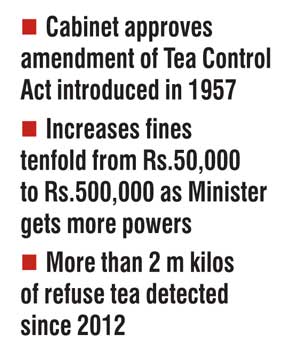Thursday Nov 14, 2024
Thursday Nov 14, 2024
Thursday, 12 May 2016 00:18 - - {{hitsCtrl.values.hits}}
 Refuse tea racketeers will soon have to fork out hefty fines that are tenfold higher than previously under a new measure to amend the Tea Control Act approved by Cabinet yesterday.
Refuse tea racketeers will soon have to fork out hefty fines that are tenfold higher than previously under a new measure to amend the Tea Control Act approved by Cabinet yesterday.
Under a Cabinet paper submitted by Plantation Industries Minister Navin Dissanayake, the Tea Control Act No.51 of 1957 will be amended to replace the Sinhala term “kasala” tea with the more appropriate term “refuse tea” to enable its easy identification and categorisation for fining purposes. The amendments will also empower the Minister to take legal action against refuse tea. Under the new regulations, the maximum fine for an offender has increased from Rs.50,000 to Rs.500,000 while the maximum amount charged in compounding of the offence has risen from Rs.10,000 to Rs.500,000.
Sri Lanka’s reputation for exporting the world’s highest quality tea has taken a bashing in recent years due to the growing racket of mixing refuse tea with freshly manufactured tea.Refuse tea is often imported from other countries and mixed with Pure Ceylon Tea or coloured to resemble fresh tea. Large scale racketeers then brand the tea as Pure Ceylon Tea and export it to key tea markets around the world.
In a string of raids over the last three years, the Special Task Force (STF) together with the Sri Lanka Tea Board has detected nearly two million kilos of refuse tea. In May 2015 nine containers containing 162 tons of refuse tea to be exported to the Middle East and Europe as ‘Ceylon Tea’ was seized by Sri Lanka Customs at the Orugodawatte Container Yard.
One of the biggest detections for 2015 was made in November when the STF seized 94,000 kilos of refuse tea to be exported under the label ‘Pure Ceylon Black Tea’ to Iraq and Kuwait. The detection was made in a warehouse in Sapugaskanda. Boxes containing 10 kilos of tea each were ready to be dispatched to the Port.
Last year alone the STF detected 244,375 kilos of refuse tea, with the biggest stock of 115,750 kilos being seized in October. In June, 78,000 kilos of refuse tea was detected, with most being found in a warehouse in Kotahena, according to media reports.
Police had earlier said at least 25 separate groups are engaged in the illegal trade with each container earning an estimated Rs.500,000 in profits to the racketeers.